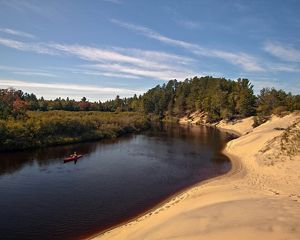Newly Restored Erie Marsh Preserve Awaits Migrating Birds, Birders This Spring.
The Nature Conservancy recently wrapped up a 12-year, $7.5 million habitat restoration project at the preserve.
Media Contacts
-
Ryan Hermes
TNC
Phone: 517-999-7745
Email: ryan.hermes@tnc.org
ERIE, Mich. — As birds make their spring migration north and the birders who enjoy spotting them flock to northwest Ohio and southwest Michigan for the Biggest Week in American Birding, both will benefit from a more than decade-long restoration project at The Nature Conservancy’s Erie Marsh Preserve that concluded this winter.
The 12-year, four phase, $7.5 million habitat restoration effort repaired degraded levees, engineered a new water management system and constructed 9.5 miles of hiking trails throughout the preserve.
“The habitat restoration project at Erie Marsh Preserve has been a labor of love over the last 12 years and I want to thank everyone who had a hand in this project, from individual and corporate donors to restoration staff and contractors,” said Helen Taylor, state director for The Nature Conservancy in Michigan. “Erie Marsh is truly a place for people and nature to thrive, and we’re so excited to welcome birds and birders alike this spring.”
Erie Marsh Preserve, which contains 11% of the remaining coastal wetlands in southeastern Michigan, is nestled along the banks of North Maumee Bay near the Michigan and Ohio border. Bald eagles, purple martins, trumpeter swans and ospreys make their homes in the trees towering above the preserve, while bluegill and largemouth bass populate the waters below.
“From the start of this project, it’s been amazing to see the increased populations of waterfowl, shorebirds, raptors, and songbirds at Erie Marsh. As the phases were completed, Erie Marsh was reconnected with Lake Erie allowing fish to reenter the preserve that has not been seen in over 60 years,” said Kim Steinberger, restoration project manager for The Nature Conservancy in Michigan. “Coastal wetlands may be in danger in some parts of the Great Lakes region, but here at Erie Marsh we continue to improve and protect these valuable ecosystems.”
Coastal wetlands are extremely diverse ecosystems found throughout the world in both freshwater and saltwater watersheds. They provide natural flood protection and erosion control, and they improve water quality by filtering out chemicals and sediment before they can be discharged into oceans and lakes. They also support local economies through recreational and tourism opportunities, and they enable the aquatic food web on which local fisheries rely.
But coastal wetlands are also severely threatened, losing habitat at disproportionally higher rates than other wetland types. Michigan alone has lost roughly half of its coastal wetland habitats over the past two centuries.
TNC would like to thank the following donors for their contributions to this project: DTE Energy Foundation, Ducks Unlimited, EGLE, Erie Shooting and Fishing Club, National Fish and Wildlife Foundation, NOAA, the USFWS–Detroit River International Wildlife Refuge, the Walters Family Foundation, Carol and Peter Walters and countless other individual donors. Your donations will have an impact for generations to come.
The Nature Conservancy is a global conservation organization dedicated to conserving the lands and waters on which all life depends. Guided by science, we create innovative, on-the-ground solutions to our world’s toughest challenges so that nature and people can thrive together. We are tackling climate change, conserving lands, waters and oceans at an unprecedented scale, providing food and water sustainably and helping make cities more resilient. The Nature Conservancy is working to make a lasting difference around the world in 81 countries and territories (40 by direct conservation impact and 41 through partners) through a collaborative approach that engages local communities, governments, the private sector, and other partners. To learn more, visit nature.org or follow @nature_press on X.



